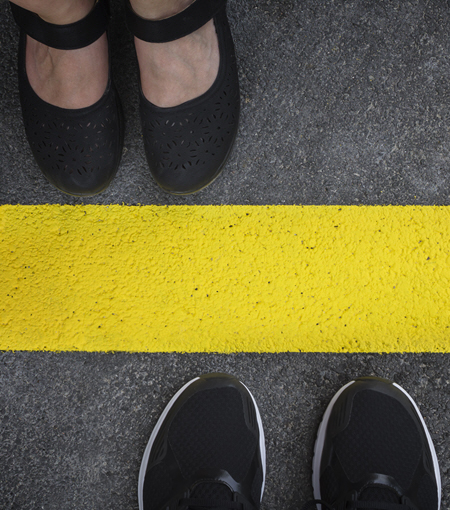 Isolation, Helplessness, Guilt… life is out of control.
Isolation, Helplessness, Guilt… life is out of control.
Do you find yourself frustrated with your current relationships? Not feeling connected seems like something is missing. It feels uncomfortable sharing personal information about yourself, and you want to run when someone starts to feel like they are getting close.
Or maybe you’re consumed by people, work, and the relationships around you. You seemed to have lost yourself along the way, or maybe you never even really knew who you were all along.
Saying “yes” when you want to say “no” and have no idea how to tell someone “no.” Saying “yes” out of fear isn’t working.
People view you as that reliable, dependable, and “make things happen” friend, mother, and co-worker, but you silently suffer inside because you can’t remember the last time you were able to spend time on yourself.
Whatever your boundary patterns, you developed them for a good reason.
Many of us emerged into adulthood with broken, wounded, or absent boundaries.
Boundary development is an ongoing process and begins in our very early years. Many events contribute to our boundary development.
Maybe you had a parent who was overbearing and strict, never allowing you to discover and develop yourself. Or as a child, your parents always took care of your wants and needs, rather than teaching you how. Or to the opposite end, maybe you had a parent who ignored your wants and needs.
Maybe you had a parent who didn’t set limits, and you got what you wanted, but never really what you needed. Or you had a parent who overshared what was going on in your parent’s lives or marriage, and you learned to carry their feelings and worry from an early age.
Maybe you experienced sexual or physical abuse, confusing appropriate physical boundaries.
As a result, you might feel like a sponge absorbing everyone else’s feelings, opinions, and responsibilities. Conversely, you might be like a turtle with a thick shell so that people cannot get close.
We need boundaries. Boundaries allow the good in and keep the bad out so we can thrive. Without them, it isn’t easy to know where we end, and others begin.
 Think you’re struggling with boundaries? Ask yourself…
Think you’re struggling with boundaries? Ask yourself…
Is your mood often dictated by the last person to whom you spoke? Do you find yourself entering a conversation feeling happy, but one sideways comment makes you feel insecure and small?
Do you “overexplain” whenever you express your own wants or needs – as though there has to be a good enough reason to do something that YOU want to do?
Do you have a hard time distinguishing between your feelings and the feelings of others around you, absorbing the weight of their problems and responsibilities as though they are your own?
Maybe you don’t have a strong sense of who you are… what you think… what your opinions are.
Setting limits seems terrifying because you are scared of other people leaving you.
When you make a mistake, do you feel as though you ARE the mistake? Does your self-esteem ebb and flow based on how well you perform (or don’t perform)?
Or maybe you’ve answered these questions in the negative…
For you, it might be the opposite, where the thought of letting your walls down and connecting with others is terrifying. Instead, your thing is saying “no” and keeping others at a distance.
Maybe you find your whole body tightening up when someone begins to share personal information about themselves. If you could, you would stick your fingers in your ears.
Or maybe thinking of asking for help from someone would be like playing a practical joke because you know you are the only person you can rely on – and life has proven this true.
Do you find that you are really good at working, producing results, and being dependable, but don’t remember the last time you had fun, laughed, or could depend on someone else?
Can’t remember the last time you felt safe being open and sharing what’s really going on with you?
 Boundaries define where we end, and other people begin.
Boundaries define where we end, and other people begin.
Any confusion of responsibility and ownership in our lives is a boundary problem.
Sometimes it can be easier to understand this concept if we think of physical property. Just as a homeowner sets physical boundaries around their yard (maybe using a fence or stakes), we also need mental, physical, and emotional boundaries for our lives.
Like a homeowner, we too need to distinguish what is our responsibility and what isn’t.
When you have a skilled professional help you in this area…
It is amazing the transformations that are possible!
You’ll discover your boundary challenges.
When we understand the origin of your boundary patterns, we can identify where extra support is needed. Let’s say you discover your boundary challenges developed from your parents being unavailable and ignoring your wants and needs. This can happen from parents being tied up in work, turning to alcohol or other things to cope, or even just being plain overwhelmed with life and not being equipped to handle it.
Whatever the reason, you may have learned from this to be needless and wantless reaching adulthood. You may find yourself working hard to take care of others’ needs without giving any attention to your own. Feeling exhausted. Knowing the origin allows us to begin to unlearn and learn new boundaries that will lead us to a life that feels rewarding, purposeful, and loving.
You’ll develop a strong sense of who you are.
Boundaries define where we end and other people begin leading us to a sense of ownership. Imagine your favorite hula-hoop from childhood. If you can’t remember yours, you can imagine mine, which was sparkly purple with those beads that swirled around, making all kinds of noise.
Now place that hula-hoop on the floor and step inside of it. The hula-hoop is going to serve as our visual guide for what’s mine and what’s not… what do I have control over, and what do I not? Inside your hula-hoop is YOU: your values, beliefs, strengths, feelings, thoughts, behaviors, choices, limits, talents, desires, likes, and dislikes. Outside of your hula-hoop is NOT yours: Everything Else. We can be in charge of what feelings, attitudes, thoughts, choices, and behaviors we let into our hula-hoop from those around us.
By having a strong sense of self and ownership, we give ourselves a true gift by letting go of the guilt of being everything to everybody else.
 You’ll learn to identify what you like and don’t like… what feels good or bad… and what you want or need.
You’ll learn to identify what you like and don’t like… what feels good or bad… and what you want or need.
Some of these things may be more trivial, like “Do I like coffee or tea? What’s my favorite kind of movie to watch?” to less trivial, like “What do I want in relationships? What values do I use to make decisions? Do I want to go on that fourth date, or do I know I’m not interested? Can I say yes to this… do I need to say no today?”
You will know when you need a hug and can ask for it. Or know you need space and ask for more alone time. You will begin to embrace and embody YOU.
You’ll get to open yourself up to love and be loved.
When you have the ability to set internal and external boundaries, you can have safe, warm, and healthy relationships. Without boundaries, relationships will cause us fear.
Too many boundaries, we won’t have any relationships, and with too few boundaries, we are vulnerable to losing all we have, including ourselves. Boundaries are the key to loving relationships.
This is YOUR life…
We cannot afford to put the responsibility of taking care of ourselves or our best interest in anyone else’s hands.
As we develop healthy boundaries, we develop a deep sense of respect for ourselves and others. We stop taking responsibility for others and take responsibility for ourselves. We don’t try to control others or allow others to control us. If we were rigid in our boundaries, we learn to loosen up a little bit. If we were too open, we learn how to shore up our “property lines.”
Setting boundaries is an ever-evolving process, including growing in self-esteem, dealing with feelings, changing the rules, and developing worthiness.
Ready for your boundaries and your sense of self to emerge? Call me today for a free 20-minute phone consultation: (615) 219-9932. Let’s get started!

